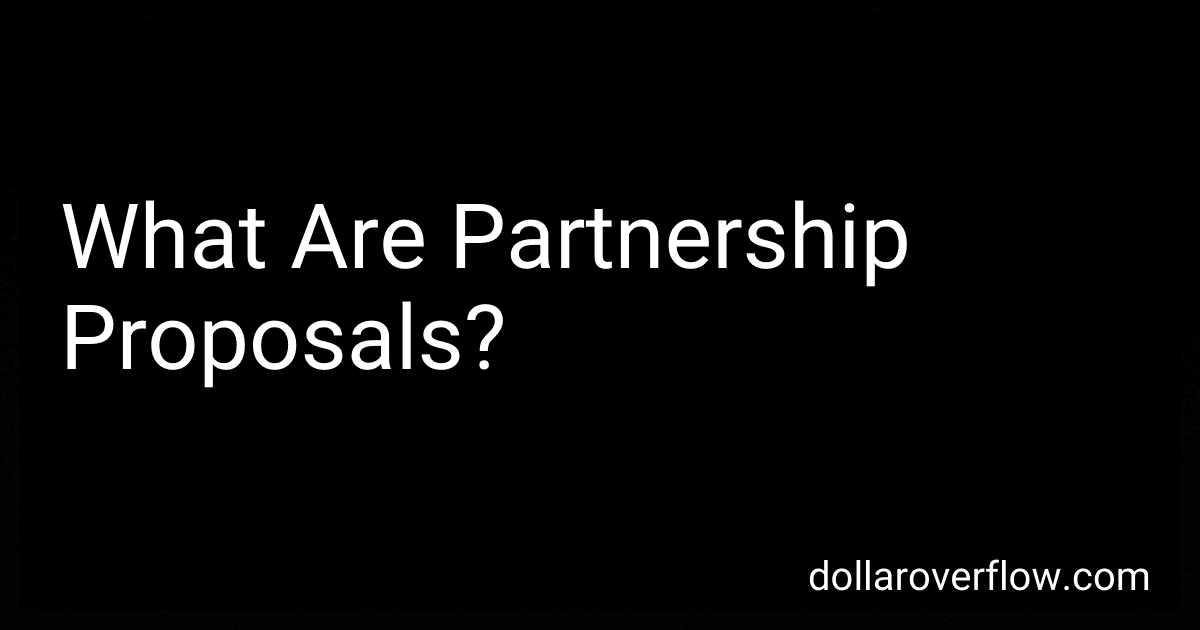Partnership proposals are formal written documents that outline the terms and conditions of a potential partnership agreement between two or more parties. These proposals typically include details about each party's responsibilities, contributions, benefits, and expectations in the partnership. The purpose of a partnership proposal is to establish a clear understanding of the partnership goals, objectives, and terms before entering into a formal agreement. This document serves as a starting point for negotiations and discussions between the parties involved in the partnership.
What is the expected response time for a partnership proposal?
The expected response time for a partnership proposal can vary depending on the complexity of the proposal, the size of the organization being approached, and the availability of key decision-makers. In general, it is advisable to follow up on the proposal within 1-2 weeks if you have not heard back. However, some organizations may take longer to review and consider proposals, so it is important to be patient and allow for sufficient time for them to respond. If a deadline is approaching or you have not received a response after an extended period, you may consider reaching out to inquire about the status of your proposal.
What is the best way to finalize your partnership proposal?
The best way to finalize your partnership proposal is to ensure that it clearly outlines the benefits and terms of the partnership, addresses any potential concerns or objections, and presents a compelling case for why the partnership will be mutually beneficial. Additionally, it is important to follow up with the potential partner to answer any questions they may have and to provide any additional information or clarification they may need. Ultimately, it is crucial to communicate openly and effectively throughout the negotiation process and to be prepared to negotiate and make any necessary adjustments to reach a mutually satisfactory agreement.
What are the common mistakes to avoid when creating a partnership proposal?
- Not clearly defining the goals and objectives of the partnership: Before creating a partnership proposal, it is essential to clearly define the goals and objectives that both parties aim to achieve through the partnership. Failing to do so can result in misunderstandings and disagreements down the line.
- Lack of research and understanding of the partner’s needs and priorities: It is important to conduct thorough research on the potential partner and understand their needs, priorities, and challenges. This will help tailor the proposal to meet their specific requirements and increase the chances of success.
- Failure to highlight the benefits and value proposition: A partnership proposal should clearly articulate the benefits and value proposition that the partnership will bring to both parties. Failing to do so may result in the partner not seeing the value in the partnership and being less inclined to accept the proposal.
- Unrealistic expectations and overpromising: It is important to be realistic and transparent in the partnership proposal. Making unrealistic promises or overpromising on what can be achieved through the partnership can lead to disappointment and potential conflicts in the future.
- Lack of clear communication and follow-up: Effective communication is key in any partnership proposal. It is important to clearly communicate the terms and conditions of the partnership and follow up with the partner to address any questions or concerns they may have.
- Failure to establish clear roles and responsibilities: It is crucial to establish clear roles and responsibilities for each party involved in the partnership. Failing to do so can lead to confusion, inefficiencies, and conflicts in the future.
- Ignoring legal and contractual considerations: It is important to consider the legal and contractual aspects of the partnership proposal, such as intellectual property rights, confidentiality agreements, and dispute resolution mechanisms. Ignoring these considerations can lead to legal issues and liabilities later on.
What is the difference between a partnership proposal and a business proposal?
A partnership proposal is a document that outlines the terms and conditions for forming a partnership between two or more parties. It typically includes information on the goals of the partnership, the responsibilities of each partner, the distribution of profits and losses, and any other relevant details.
On the other hand, a business proposal is a document that is used to pitch a product or service to a potential client or investor. It typically includes information on the business idea, the target market, the competitive landscape, the marketing strategy, and the financial projections.
While both types of proposals involve outlining a business arrangement, the key difference is that a partnership proposal focuses on forming a partnership between parties, while a business proposal focuses on pitching a specific business idea or project.
